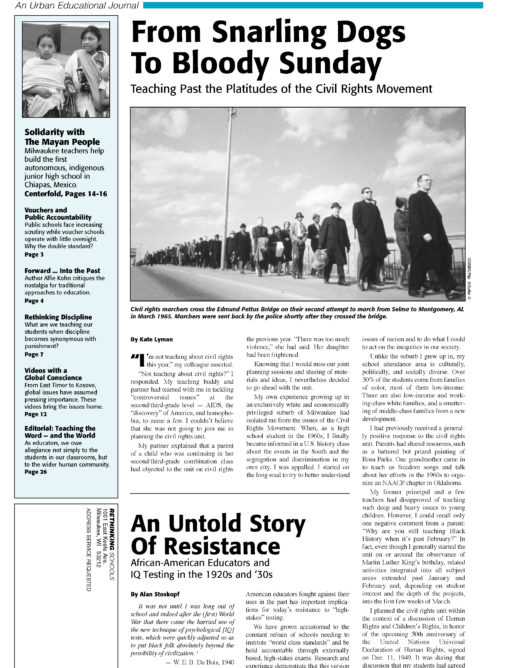No’ Is the Right Answer
A high school student explains why she refused to take her state-mandated Massachusetts Comprehensive Assessment Test
On May 17, a dozen sophomores at Cambridge Rindge and Latin High School decided not to take the state-mandated Massachusetts Comprehensive Assessment Test, better known as the MCAS. I was one of them.
For weeks we had carefully researched the political and moral issues at stake. We were aware that it was going to be difficult to refuse the test. When you are a sophomore in high school, it is not easy to go against the orders of your teachers, your advisors, your school, and your state. We were not certain of the punishment that we would receive. Detention, suspension, expulsion? All had been mentioned as possibilities.
When we announced what we were going to do, we received a lot of opposition. We were told that we were going to bring down the cumulative score of our house and of the entire school. But we believed, and still do, that the reasons for fighting this test are more important than any score.
Beginning with the class of 2003, high school students who fail the MCAS test will not be able to graduate. We believe that a single test should not determine the success and future of a student.
How can four years of learning and growing be assessed by a single standardized test? There are so many things that students learn throughout high school – how to play an instrument, act, draw, paint. They learn photography, how to program a computer, fix a car engine, cook tortellini Alfredo, throw a pot, or design a set for a play. Many students say these are among the most important skills they learn in high school, yet all are skills the MCAS fails to recognize.
The MCAS test is expected to take over 20 hours of class time. No test should take that much time out of learning, especially not one whose supposed rationale is that students are not learning enough in school.
The material on the MCAS is very specific. For students to do well, teachers must redesign their curriculums to teach to the test. Districts and school administrators, eager to show high scores, have pressured teachers to create units based on the material. Because the test is based largely on memorization of facts, teachers will have to teach their students these specific facts instead of teaching for deep comprehension and understanding of the material.
Students who have been in this country for only three years are required to take the test. How can someone who has been speaking English for three years be expected to write essays with correct spelling and grammar, which is a requirement to receive a proficient score? Special needs students are also required to take this test to graduate.
Supposedly, this test will be used to evaluate teachers as well as students. However, a test like this simply measures whether a teacher teaches to the test.
If the MCAS test is instituted in Massachusetts, the scores will become a major consideration for parents when they choose a school for their children. Schools will therefore want their scores to be as high as possible. Programs such as Metco, which integrates inner-city students into suburban schools, may be discouraged since it has been shown that inner-city students do not score as well as suburban students.
We are also concerned about the future of innovative programs, such as the Interactive Math Program, or IMP, which does not follow the traditional progression of algebra, geometry, trigonometry, and calculus, but integrates these throughout all four years. Therefore, a sophomore IMP student will not know the expected geometry curriculum, but will know some trigonometry and calculus that is not included on the MCAS.
Also, certain in-depth courses, such as “Bible as Literature,””The Holocaust,” “Reading and Writing on Human Values,” “Women in Literature,” and “African-American Literature” will no doubt be off-limits to freshmen and sophomores because they are not geared to the MCAS.
My humanities teacher in eighth grade used the “Facing History and Ourselves” curriculum, which spends about eight weeks teaching in incredible depth about the Holocaust. We learned about Nazi propaganda and how it compares to propaganda used today. We examined the causes of the Holocaust, confronted the difficult philosophical and moral issues it raises, and focused on what we can do to prevent it from happening again.
This is one of the best educational experiences I have ever had. Because of it, I have a deep and complex understanding of the Holocaust. All the dates and facts that I learned may not stay with me, but I feel certain that my understanding of the event will.
We are worried that such innovative and respected curriculums as IMP and “Facing History” will become casualties of the MCAS test mentality.
We are not saying nothing should be done to improve public education in Massachusetts. We are simply saying that taking a paper and pencil test to graduate is not the way to amend education. Massachusetts has already spent $24 million on the MCAS test, and an estimated $14 million more is being spent this year. Roughly that same amount will be spent every year the test is given. We could use that money in better ways – for more staff developers, teacher workshops, improved bilingual education, better school supplies, and better fine arts and technical arts programs.
This is our last chance to raise awareness about getting an education that is not standardized, but meaningful, deep, and personalized. We believe an education like that is worth working for.

